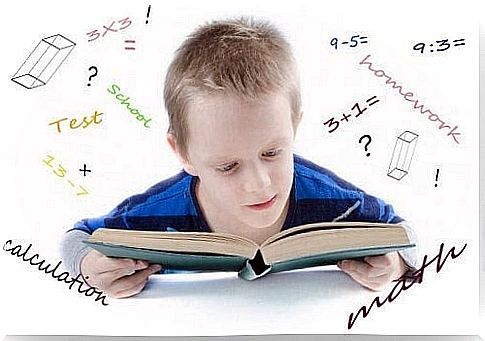How To Promote Mathematical Skills In Children

Mathematics has a deep relationship with the environment that surrounds us. Therefore, it is important to stimulate and promote mathematical skills in children.
What benefits does it offer? And how can you achieve them?
The concept of mathematical competence
Mathematical competence is not the same as mathematical ability. Mathematical skills combine the ability to use numbers and the basic operations that can be performed between them to interpret different types of information. This helps us to deal with and solve everyday and complex problems.

Promoting mathematical skills in children is beneficial for their learning. In short, mathematical competence combines mathematics with problem solving in the real world. In other words:
From the cradle of humanity, we have needed to measure, identify, quantify and describe everything that surrounds us. In fact, the development of mathematical competence and human civilization has gone hand in hand. Therefore, it is important to stimulate and promote mathematical skills in children.
Aspects included in mathematical skills
- The ability to interpret information or data about things that surround us.
- Management of basic mathematical elements (measurements, geometric elements, etc.) in daily life.
- Reasoning processes that solve problems in different contexts.
The importance of stimulating math skills in children
In itself, it is logical: mathematical thinking is fundamental because it includes the understanding of abstract concepts, in addition to helping to understand different relationships.
These skills contribute to a person’s ability to develop to their full potential, which helps them to successfully achieve their goals.
Intelligence also develops when solving problems. It also establishes relationships between different concepts and promotes planning with regard to the desired goals.
Ways to promote math skills in children
Note that when the child stimulates his or her mathematical skills, you must consider his or her age to make it appropriate and respect the child’s own development and pace.
Here are some ways to do it:
1. Independent experiments
Let the child experiment with different objects. In this way, they will realize their characteristics and see differences and similarities. You also stimulate your child’s motivation and curiosity in this way.
2. Plan the logistics for different activities
Suggest different activities that involve classifying, comparing or identifying different objects. You promote an understanding of the relationship between objects in this way.
3. Teach your children about the cause and effect of actions and to use observations to draw conclusions
Children must learn that the decisions they make in daily life have consequences and effects. Through this, you should encourage deductive reasoning to solve problems.
Observations You should encourage your child to use in different scenarios to gain a better understanding of the environment when it is related to mathematical activities.
Use games and games to help them approach problems
You can take advantage of various games that stimulate the development of the mind, such as riddles, sudoku and card games. Address issues that require mental effort on the part of the child.
You need to consider their age when doing this, because they will be discouraged and give up if the problem is too complicated for them.
5. Motivate them to reflect and ask questions
Encourage your children to reflect on certain things in everyday life, including things that seem inexplicable, and then speculate and discuss with them to find a logical explanation.
Ask questions to help them imagine different possibilities. For example, you could use questions such as: “What would you do about…?”
Let them deal with mathematical problems
When they are faced with a mathematical problem, you can give your children guidance or a way to solve it, but they themselves must be given a chance to find the solution.
You can encourage them to use and manipulate quantities. For example, you can encourage them to compare product prices.

Benefits of stimulating math skills in children
What are the benefits of stimulating math skills in children?
- Performing mathematical activities without pen and paper stimulates attention, focus and ability to concentrate.
- According to experts, it develops versatility and independence when it comes to solving problems.
- It helps them reflect before making decisions.
- It contributes to the development of analytical thinking and stimulates wisdom
Analytical thinking
Analysis means that you break down different arguments into your components, analyze them and reach a conclusion. In this way, the understanding of a problem or a subject is significantly improved.
Thanks to analytical thinking, the ability to investigate also develops, which helps your children to be able to make a better assessment of whether they are dealing with truth, facts or fiction. This contributes to the child’s ability not to be manipulated or deceived in the future.
Over time, they will also develop wisdom, which is the ability to know how to apply the knowledge they have acquired, since mathematical skills are related to other sciences, such as technology.
It keeps the mind sharp
Mathematical competence contributes to a greater understanding of different problems, because mathematics itself explains how things work and are connected.
This facilitates communication due to the fact that they stimulate the expression of coherent, clear and precise thoughts and through greater general understanding.
Having strong mathematical skills also sharpens the senses, as everyday life consists of confrontations with situations that require decisions and choices. It is a fact that children can not avoid these.
And on many occasions, there is more than one way to solve a problem. For all these reasons, it is necessary and very beneficial to promote mathematical skills in children.









